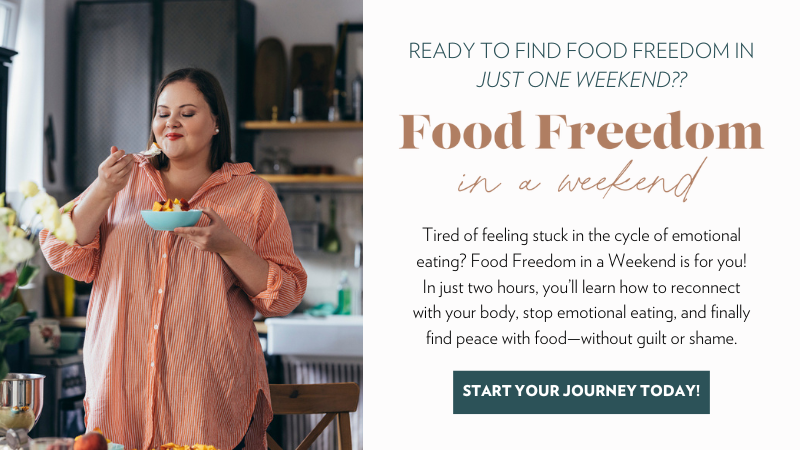If you’ve ever wondered whether Vyvanse for binge eating could finally be the answer, you’re not alone. Many women who come to me feel stuck in the cycle of restriction, cravings, and late-night eating—and they’re curious if medication could be the missing piece.
The truth? Vyvanse can absolutely help some people reduce binge episodes and quiet food noise in the short term. But like many quick fixes, it also comes with limitations—and it doesn’t address the deeper reasons why binge eating shows up in the first place.
As a binge eating therapist, I’ve seen firsthand that real healing requires more than willpower or a prescription. It’s about learning how to work with your brain and body, not against them. And that’s exactly what this article will explore.
Hi, I’m Dr. Meredith MacKenzie—a clinical counsellor, binge eating therapist, and founder of the One Body to Love program. I support women who are tired of the dieting cycle and ready to create a peaceful relationship with food and their bodies. If you’ve been struggling with emotional eating, body image concerns, or the feeling that you just can’t “trust yourself” around food, I want you to know—you’re not alone. Recovery is possible, and it doesn’t come from more restriction or self-criticism. It starts with compassion, evidence-based strategies, and reconnecting to your body’s cues. For ongoing support and everyday conversations about food freedom, intuitive eating, and body trust, join me on Instagram.

When Vyvanse for Binge Eating Feels Like a Quick Fix
Let me introduce you to Jenna. Jenna was diagnosed with ADHD in her mid-30s after years of struggling with overwhelm, forgetfulness, emotional sensitivity, and what she called “bizarre eating habits I couldn’t explain.”
Every night, she found herself in the kitchen, eating more than she wanted or was even hungry for. After long, hyperfocused workdays where meals slipped her mind, Jenna would crash. Exhausted, undernourished, and running on fumes, her brain—starved for dopamine—went straight to food.
Binge eating disorder (BED) is actually the most common eating disorder in North America—affecting millions of people across age, gender, and body size (National Eating Disorders Association, n.d.)
When her doctor suggested trying Vyvanse for binge eating, Jenna was hopeful. At first, it felt like a game-changer. She had more focus, fewer intrusive food thoughts, and she wasn’t reaching for snacks all day. But within a couple of months, new challenges appeared. She often wasn’t hungry until mid-afternoon, and when the medication wore off, her ADHD symptoms returned full-force—along with the binge eating.
ADHD, Binge Eating, and Why the Connection Matters
At first glance, ADHD and binge eating might seem unrelated. But for many of the women I work with as a binge eating therapist, the two are deeply connected. For those who weren’t diagnosed with ADHD until adulthood, the result is often years of feeling “lazy” or “out of control” with food—when in reality, their brains were wired differently all along.
You are not lazy. You are not broken. Your brain has unique needs, and you deserve strategies that honor that difference
How ADHD & Binge Eating Intersect
ADHD impacts executive functioning—planning, organizing, following through, and regulating emotions. It also affects how your brain processes dopamine, the neurotransmitter tied to motivation and reward. Combine that with the pressure of diet culture and rigid food rules, and it creates the perfect storm for binge eating.
Here are a few patterns I see all the time in my therapy practice:
- Missed meals and hunger cues. Struggles with meal planning and time management often lead to skipped meals, followed by intense evening cravings.
- Time blindness. Hours slip by before realizing you haven’t eaten, leaving your body running on empty.
- Impulsivity. When hunger finally hits, it’s easy to grab the first food you see—even if it isn’t satisfying.
- Dopamine-seeking. A dopamine deficit means the brain naturally gravitates toward high-reward foods, especially when overstimulated or undernourished.
When your brain is craving dopamine and your body is starving, binge eating makes sense.
And that’s where Vyvanse for binge eating enters the conversation—a medication approved for both ADHD and binge eating disorder.

The Promise and Pitfalls of Vyvanse for Binge Eating
When Vyvanse was first approved for binge eating disorder, it felt like a breakthrough. For women like Jenna, it often brings immediate relief—more focus, fewer food-related thoughts, and less impulsive snacking. Many describe the early weeks as a kind of “quieting” of the food noise in their minds.
Vyvanse is the only FDA-approved medication for treating binge eating disorder (National Eating Disorders Association, n.d.). But as I tell my clients, medication is just one piece of the puzzle.
But here’s the challenge: Vyvanse doesn’t teach you how to eat in a way that supports your body long-term. Many clients tell me they don’t feel hungry until the afternoon, then end up ravenous once the medication wears off. Others notice their ADHD symptoms return at night—exactly when binge eating tends to show up.
As a binge eating therapist, I see this pattern often: medication can provide helpful support, but it’s not a stand-alone solution. Without learning how to tune into hunger cues, manage emotions, and create flexible meal routines, the cycle of restriction and bingeing usually comes back.
Vyvanse for binge eating can be a valuable tool—but only as part of a bigger picture that addresses both the brain and the body.
If this resonates with you, you’ll love the One Body to Love Podcast, where I dive deeper into these topics every week.

So Is Vyvanse for Binge Eating Right for You?
Maybe.
For some people, Vyvanse creates just enough mental space to start building new skills and routines. For others, side effects like anxiety, appetite suppression, or concerns about dependency make it unsustainable. That’s why I always recommend working with both your medical doctor and a binge eating therapist when considering medication. Because the goal isn’t just fewer binges—it’s creating a life of trust, consistency, and freedom around food.
Healing binge eating isn’t about willpower. It’s about nourishment, nervous system regulation, and support.
Looking for a simple first step? Food Freedom in a Weekend can help you start rebuilding trust with food in just a few days.

Strategies Beyond (or Alongside) Vyvanse for Binge Eating
Medication alone won’t teach your body how to eat in a way that feels safe and sustainable. Here are strategies I often use with clients:
- Structured eating. Plan meals and snacks at regular times, even if you don’t feel hunger cues.
- Body cues journal. Track emotions, energy, and focus to notice patterns.
- Gentle reminders. Use phone alarms or sticky notes to prompt regular check-ins.
- Therapy support. Work with a therapist or coach who understands both ADHD and disordered eating.
It’s not about perfection. It’s about building rhythms that support your brain and body.

Reflection Journal Prompts
- When during the day do I feel most out of control with food?
- Am I unintentionally underfeeding myself earlier in the day?
- How does my energy and focus shift in relation to meals?
- What’s one small way I can nourish myself consistently this week—even without “feeling” hungry?
Let these questions guide you with curiosity, not criticism. You’re not failing for needing support—you’re learning how to care for yourself differently.

So, Is Vyvanse for Binge Eating the Answer?
Maybe part of it. But it’s not the whole answer.
The truth is, Vyvanse can be a helpful support—but it isn’t a substitute for learning how to nourish yourself, regulate your nervous system, and build a sustainable rhythm with food. That’s the deeper work.
The real work isn’t about fixing yourself. It’s about understanding yourself—and supporting your body, brain, and heart in a way that actually works. As a binge eating therapist, this is the foundation I help clients build every day.
If you’re looking for a comprehensive, judgment-free space to heal your relationship with food, check out One Body to Love—my signature program designed to help you break free from the binge-restrict cycle and finally feel at home in your body.
Or, if nighttime is the hardest part of your day, start with my free guide: 5 Steps to End Binge Eating at Night. It’s quick to read, practical, and packed with tools you can use right away.
Ready for personalized support? Book a one-to-one consult with me today. Together, we’ll explore your unique challenges and create a plan to help you move toward food freedom with compassion and confidence.